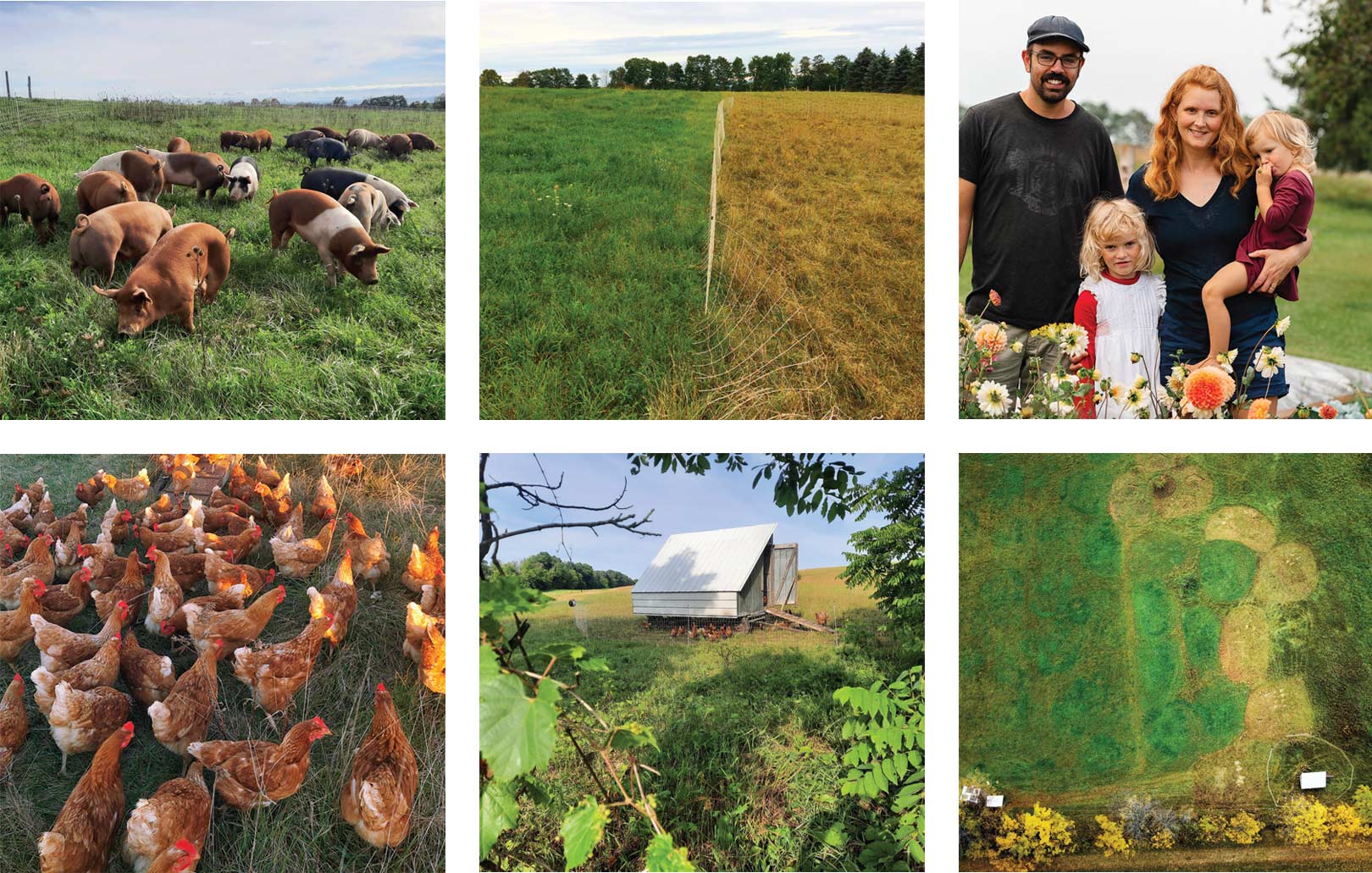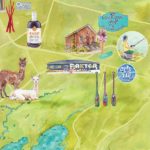
Maintaining smaller pastures, raising diverse species of livestock and moving them around continually, providing sources of animal-based fertilization and exercising intelligent water management practices: these are key to the philosophy of Evermeadow Farm’s owners, Josh Noiseux and Janita Wiersma. The result is an ecosystem that contributes to the soil more than it takes from it, and helps ensure that the land has the strength and resources to regenerate itself indefinitely.
Everything is connected – that’s one of the key principles of ecology. At Evermeadow Farm, Josh Noiseux and Janita Wiersma are applying that principle to food production as they work on making a living from a small farm while improving the quality of its soils.
Josh and Janita practise regenerative farming, which stands in contrast to the more conventional modes of farming that produce the bulk of Canada’s food. Regenerative farming seeks to understand the characteristics of the lands being farmed and integrate them in a plan that not only produces food but benefits soils and biodiversity. The focus is on actively building organic matter in the soil and preventing erosion through rotational grazing, animal-based fertilization, perennial crops, and water management. Josh and Janita first brought their farming philosophy to the land in 2020. The couple were fortunate that Janita’s parents owned land in the Cold Springs area they could lease “to provide a pathway to get into the driver’s seat as quickly as possible. They [Janita’s parents] are really supportive of us, which is lucky too,” says Josh.
One of their first tasks on the farm, which had been previously planted in alfalfa and orchard grass, was to do baseline measurements of soil quality, forage yields and plant diversity so they could follow and understand the impacts of regenerative farming over time.
Rather than harvest hay as previous tenants had done, Josh and Janita introduced sheep, pigs, broiler chickens and laying hens to the property, each playing a specific role in improving soil quality while providing saleable farm products.
“Each individual species has its own suite of characteristics,” says Josh. “Our hens scratch up compacted soil and spread seed and fertile manure. Our sheep manage the grass, distribute nutrients and build soil. Our pigs recycle waste nutrients and disturb the soil to prepare for re-seeding pastures, and our broiler chickens bring fertility into the farm as they move daily across the landscape.”
“For me, the main thing is scientific ecology,” says Josh, who sees regenerative farming as a marriage of conservation and food production. “Humans are part of the landscape and humans manage the landscape. You can’t silo conservation.”
Evermeadow began on a small scale, with 15 acres. Now, with three years of experience, Josh and Janita, are looking forward to 2023, when their 45- acre operation will include 75 to 80 sheep, 60 hogs, and 3,000 chickens, licensed under the Chicken Farmers of Ontario Artisanal Chicken program. They’re also installing an egg grading station so eggs produced on the farm, and by neighbouring producers, can sell under the Evermeadow brand. “It’s certainly cooking along,” comments Josh. Products sold on the Evermeadow website include cuts of heritage pork, a variety of sausages, grass-fed lamb and pasture-raised chicken.
And in just a few seasons Evermeadow is experiencing the on-the-ground benefits of regenerative farming. “It’s shocking to me how fast it’s working,” says Josh, noting “huge improvements in the composition of plants” on what had been a “really degraded hayfield.” They’re now seeing a greater diversity of native and naturalized flowers, more insects, and more swallows. Evermeadow is located not far from the Rice Lake plains, an area that would have been tallgrass prairie prior to European settlement. Plans for the future include restoring some of the natural features of tallgrass prairie savanna by planting native trees and grasses.
“We conceive of the farm as a habitat, not just for our domestic species, but also for any number of wild, feral, volunteer, and visitor species,” says Josh. “We view our role as facilitators, helping to make more room for all of these creatures to cohabit in the landscape. Through our management choices, like not tilling, maintaining perennial pastures, planting trees and shrubs, and encouraging the return of native species, we make space for more life, which in turn makes space for even more life.”
Still, challenges remain, including one known to small farmers of all description – making a living. While Josh and Janita maintain lofty goals for regenerative farming at Evermeadow, they also know that long-term sustainability requires a healthy bottom line.
That bottom line includes paying fair wages to employees. “We don’t do it alone, we have one full time employee and a few part-time staff,” says Josh. “We are a committed living wage employer, and have never used free or underpaid labour or internships as part of our staffing model. We see this as integral to our mutually beneficial participation in our local community.”
Currently the farm operates as a break-even pro – position, with hopes of achieving profitability next year. “The key lesson we’ve learned is the extent to which small farms depend on outside income,” says Josh. At Evermeadow, strategies to achieve profitability on the farm include ramping up lamb and pork production and continuing children’s programs and adult workshops on farm ecology that got underway last year. Josh is also acting as a consultant for other landowners, providing them with plans to help meet their ecological and financial goals.
A challenge specific to regenerative farming is that some of its benefits, such as improved soil quality and biodiversity, don’t lend themselves to being included on a statement of profits and losses. Josh says Evermeadow is working with a professor at Ivey Business School of the University of Western Ontario to create ways of measuring those benefits. They’re also looking at how farmers might be compensated for the improvements they make to the land. One example of this is ALUS (Alternative Land Use Services), a non-profit program that supports Canadian farmers who maintain and enhance ecological services on their lands.
“We’re not at all conventional farmers,” comments Josh. Broadly stated, conventional farming is an efficient way to produce food, but use of chemical fertilizers can result in depleted soils and fewer insects, birds, and animals as farms grow in scale. But Josh doesn’t want Evermeadow’s endeavours to be seen as a critique of current agriculture practices. Instead, he’d like regenerative farming to be regarded as an approach with benefits for all kinds of agriculture, no matter what the label is. “We’re part of the bigger farming community,” he says. “And we’ve had a lot of support from them.”
Story by:
Norm Wagenaar




